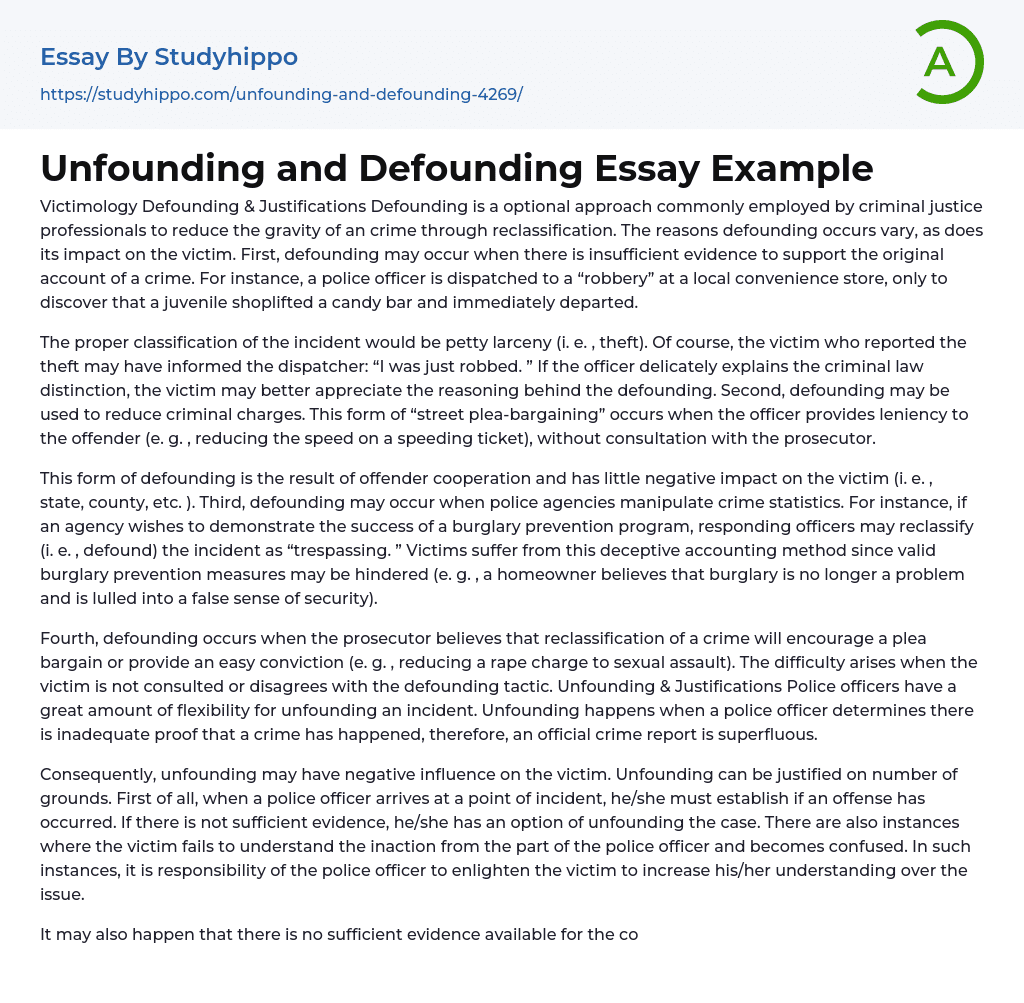Victimology Defounding & Justifications Defounding is a optional approach commonly employed by criminal justice professionals to reduce the gravity of an crime through reclassification. The reasons defounding occurs vary, as does its impact on the victim. First, defounding may occur when there is insufficient evidence to support the original account of a crime. For instance, a police officer is dispatched to a “robbery” at a local convenience store, only to discover that a juvenile shoplifted a candy bar and immediately departed.
The proper classification of the incident would be petty larceny (i. e. , theft). Of course, the victim who reported the theft may have informed the dispatcher: “I was just robbed. ” If the officer delicately explains the criminal law distinction, the victim may better appreciate the reasoning behind the defounding. Second, defounding may be used to reduc
...e criminal charges. This form of “street plea-bargaining” occurs when the officer provides leniency to the offender (e. g. , reducing the speed on a speeding ticket), without consultation with the prosecutor.
This form of defounding is the result of offender cooperation and has little negative impact on the victim (i. e. , state, county, etc. ). Third, defounding may occur when police agencies manipulate crime statistics. For instance, if an agency wishes to demonstrate the success of a burglary prevention program, responding officers may reclassify (i. e. , defound) the incident as “trespassing. ” Victims suffer from this deceptive accounting method since valid burglary prevention measures may be hindered (e. g. , a homeowner believes that burglary is no longer a problem and is lulled into a false sense of security).
Fourth, defounding occurs when the prosecutor believes tha
reclassification of a crime will encourage a plea bargain or provide an easy conviction (e. g. , reducing a rape charge to sexual assault). The difficulty arises when the victim is not consulted or disagrees with the defounding tactic. Unfounding & Justifications Police officers have a great amount of flexibility for unfounding an incident. Unfounding happens when a police officer determines there is inadequate proof that a crime has happened, therefore, an official crime report is superfluous.
Consequently, unfounding may have negative influence on the victim. Unfounding can be justified on number of grounds. First of all, when a police officer arrives at a point of incident, he/she must establish if an offense has occurred. If there is not sufficient evidence, he/she has an option of unfounding the case. There are also instances where the victim fails to understand the inaction from the part of the police officer and becomes confused. In such instances, it is responsibility of the police officer to enlighten the victim to increase his/her understanding over the issue.
It may also happen that there is no sufficient evidence available for the conviction of crime. In this case, he/she must inform the district attorney about bypassing the written report. Once again, he/she also inform the victim to avoid any misunderstanding. At other times, the crime is relatively minor and will divert the focus of the police officer when he/she is required to concentrate on more serious offences. Yet another reason can be officer bias because he/she feels that the victim has facilitated his/her own victimization Conclusion
Process of unfounding and defounding helps to conserve time and resources of police department by avoiding minor and in
many cases, no crime at all. As a result, police department concentrates on more important and serious crime and offences. ? References Burke, T. (2009). Defounding. In Janet K. Wilson (Ed. ), The Praeger Handbook of Victimology, (pp. 76-77). Santa Barbara, California: Praeger. McCleary R. , Nienstedt, B. C. & Erven J. M. (1982). Uniform Crime Reports as Organizational Outcomes: Three Time Series Experiments,” Social Problems 29 (1982): 361-72
- Jurisprudence essays
- Social Injustice essays
- Juvenile Justice essays
- John Locke essays
- 9/11 essays
- A Good Teacher essays
- A Healthy Diet essays
- A Modest Proposal essays
- A&P essays
- Academic Achievement essays
- Achievement essays
- Achieving goals essays
- Admission essays
- Advantages And Disadvantages Of Internet essays
- Alcoholic drinks essays
- Ammonia essays
- Analytical essays
- Ancient Olympic Games essays
- APA essays
- Arabian Peninsula essays
- Argument essays
- Argumentative essays
- Art essays
- Atlantic Ocean essays
- Auto-ethnography essays
- Autobiography essays
- Ballad essays
- Batman essays
- Binge Eating essays
- Black Power Movement essays
- Blogger essays
- Body Mass Index essays
- Book I Want a Wife essays
- Boycott essays
- Breastfeeding essays
- Bulimia Nervosa essays
- Business essays
- Business Process essays
- Canterbury essays
- Carbonate essays
- Catalina de Erauso essays
- Cause and Effect essays
- Cesar Chavez essays
- Character Analysis essays
- Chemical Compound essays
- Chemical Element essays
- Chemical Substance essays
- Cherokee essays
- Cherry essays
- Childhood Obesity essays




